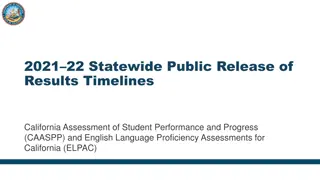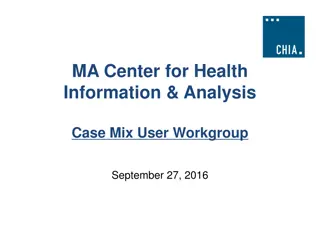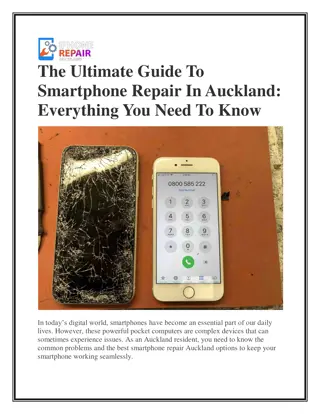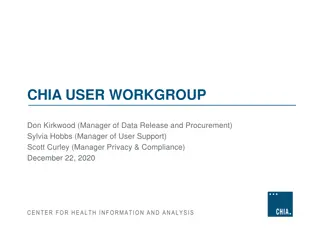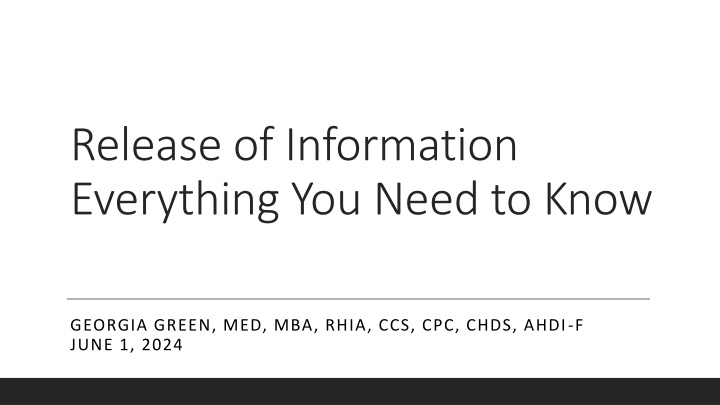
Release of Information: Legal & Regulatory Requirements
Explore the crucial aspects of release of information in the healthcare industry, covering legal and regulatory requirements, federal and state laws, privacy ranking, disclosure laws involving minors and decedents, and the role of a personal representative in ensuring patient rights. Gain insights into key terms, record request anatomy, types of disclosures, and patient rights to stay compliant and uphold confidentiality.
Download Presentation

Please find below an Image/Link to download the presentation.
The content on the website is provided AS IS for your information and personal use only. It may not be sold, licensed, or shared on other websites without obtaining consent from the author. If you encounter any issues during the download, it is possible that the publisher has removed the file from their server.
You are allowed to download the files provided on this website for personal or commercial use, subject to the condition that they are used lawfully. All files are the property of their respective owners.
The content on the website is provided AS IS for your information and personal use only. It may not be sold, licensed, or shared on other websites without obtaining consent from the author.
E N D
Presentation Transcript
Release of Information Everything You Need to Know GEORGIA GREEN, MED, MBA, RHIA, CCS, CPC, CHDS, AHDI-F JUNE 1, 2024
Release of Information Training Agenda Legal & Regulatory Requirements Department Operations Key Terms Anatomy of a Record Request Types of Disclosures Other Patient Rights
Legal & Regulatory Requirements
Federal Laws Health Insurance Portability and Accountability Act 45 CFR Part 160 and Subparts A and E of Part 164 Confidentiality of Substance Use Disorder Patient Records 42 CFR Part 2
State Laws Revised Code of Washington (RCW) Washington Administrative Code (WAC)
Ranking Privacy Laws HIPAA (Federal) RCW (State) 42 CFR Part 2 (Federal) Apply the law that provides the most privacy and security.
Disclosure Laws Involving Minors Type of Care Minimum Age of Consent Law RCW 9.02.100(1); State v. Koome, Reproductive Healthcare No lower age limit STD/AIDS 14 RCW 70.24.110 Mental Health 13 RCW 71.34.530 Substance Abuse 13 RCW 70.96A.235 General medical and surgical care 18 if single and unemancipated RCW 26.28.010 Nonemergency outpatient or primary care Homeless child or youth RCW 7.70.065(3)
Disclosure Laws Involving Decedents RCW 70.02.140 A personal representative of a deceased patient may exercise all of the deceased patient's rights under this chapter. If there is no personal representative, or upon discharge of the personal representative, a deceased patient's rights under this chapter may be exercised by persons who would have been authorized to make health care decisions for the deceased patient when the patient was living under RCW 7.70.065.
Personal Representative of a Decedent 1. The appointed guardian of the patient, if any; 5. Parents of the patient; then adult brothers and sisters of the patient; 2. The individual, if any, to whom the patient has given a DPOA for healthcare 6. Adult grandchildren of the patient who are familiar with the patient; then adult nieces and nephews, then adult aunts and uncles; then any adult who exhibits care and concern. 3. The patient's spouse or state registered domestic partner; 4. Children of the patient who are at least eighteen years of age;
Department Operations
Who Does What and How? Task Team Member Tools Customer Service/Phone Intake ROI Tech I Phone Center Software Email Intake/Responses ROI Tech I CRM Software Categorizing, Validating/Entry ROI Tech I Release System Verifying Authority ROI Tech II Release System Retrieving/Disclosing PHI ROI Tech II Release System Transmission of PHI ROI Tech II Portal, Email, Fax, CD, USB, Paper Completion/Billing ROI Tech II Release System Other Requests ROI Tech III (Lead) Release System
Protected Health Information (PHI) Protected Health Information, or PHI, is any health information that can identify an individual, that is in possession of or transmitted by a "covered entity" or its business associates that relates to a patient's past, present, or future health.
Covered Entity A covered entity includes health plans, health care clearinghouses, and healthcare providers who electronically transmit any health information in connection with transactions for which HHS has adopted standards.
Designated Record Set (DRS) Designated record set (DRS) is a defined group of information that may consist of medical and billing records, information about payments, case management systems, and other information used to make health care decisions.
Information Blocking Information blocking is a practice by an "actor" that is likely to interfere with the access, exchange, or use of electronic health information (EHI), except as required by law or specified in an information blocking exception. The 21st Century Cures Act applied this law to healthcare providers, health IT developers of certified health IT, and health information exchanges (HIEs)/health information networks (HINs).
Minimum Necessary The Minimum Necessary Standard is a fundamental component of the Health Insurance Portability and Accountability Act (HIPAA) that ensures only the minimum necessary amount of protected health information (PHI) is used, disclosed, or requested for a specific purpose, such as treatment, payment, or healthcare operations.
TPO (Treatment, Payment, Operations) The treatment, payment, and operations (TPO) exception permits covered entities, such as healthcare providers, to use and share PHI without requiring patient authorization for specific purposes directly related to treatment, payment, and healthcare operations.
Anatomy of a Record Request
Request vs Authorization 7 Ws & H Who is making the request? When is it due? Who is the recipient? Where will we send it? Who is the patient? Why do they want the PHI? What specific PHI do they want? How will they receive it?
The HIPAA-Compliant Authorization pt 1 1. A meaningful description of PHI to be disclosed 4. A description of the purpose for disclosure 2. The name of the person(s) or class of person(s) authorized to disclose the PHI 5. An expiration date or event 6. The date and signature of the patient or the patient s personal representative 3. The name of the person(s) or class of person(s) to whom the PHI may be disclosed 7. If the authorization is signed by the personal representative, their authority
The HIPAA-Compliant Authorization pt 2 Plus these required statements: 1. The person has the right to revoke the authorization in writing at any time (and a description of how they may revoke). 2. The person s treatment, payment, enrollment or eligibility for benefits is not conditioned on whether they signed the authorization. 3. Any information disclosed per the authorization may be re-disclosed by a recipient and is no longer protected by federal or state health privacy laws.
Types of Disclosures
Continuity of Care (Treatment) Disclosures for the purpose of treatment or care coordination Recipient is a covered entity under HIPAA Patient authorization is not required Minimum necessary standard must still be observed 42 CFR Part 2 restrictions may apply
Patient Patient requesting for self No authorization required No restrictions on what can be release, not even 42 CFR Part 2 Private patient record portal companies are included
Authorized Requests to Third Parties Any request not excluded by TPO or the 12 National Priority Purposes must be authorized by the patient in writing. Some examples: Attorneys Insurance underwriters Disability insurance carriers, including SSA Record retrieval services Social service agencies And many more
Regulatory Requests not for the purpose of treatment or for disclosure to the patient but also not requiring authorization, includes these purposes: Payment Operations 14 National Priority Purposes
Subpoena Duces Tecum & Court Orders Requires specialized knowledge and experience May require the testimony of a record custodian Consultation with facility legal team is often required Notification period and satisfactory assurances concept Objection or quash period Foreign subpoenas 42 CFR Part 2 requires patient authorization for a subpoena or a special court order
Twelve National Priority Purposes 1. Required by Law 7. Decedents 2. Public Health Activities 8. Cadaveric Organ, Eye, or Tissue Donation 3. Victims of Abuse, Neglect, or Domestic Violence 9. Research 10. Serious Threats to Health or Safety 4. Health Oversight Activities 11. Essential Government Functions 5. Judicial and Administrative Proceedings 12. Workers Compensation 6. Law Enforcement Purposes
Other Patient Rights
Amendments 164.526 Amendment of protected health information. (1) Right to amend. An individual has the right to have a covered entity amend protected health information or a record about the individual in a designated record set for as long as the protected health information is maintained in the designated record set. (2) Denial of amendment. A covered entity may deny an individual's request for amendment, if it determines that the protected health information or record that is the subject of the request.
Disclosure Accounting Individuals have a right to an accounting of the disclosures of their protected health information by a covered entity or the covered entity s business associates Made without their authorization or permission For 12 national priority purposes for the public interest For a maximum period of six years preceding the request for the report.
Right to Request Restriction Ask us to limit what we use or share You can ask us not to use or share certain health information for treatment, payment or our healthcare operations, such as administrative, financial, legal and quality improvement activities. We are not required to agree to your request, and we may deny it if it would affect your care. If you pay for a service or healthcare item out-of-pocket in full, you can ask us not to share that information for the purpose of payment or our operations with your health insurer. We will agree, unless a law requires us to share that information.
Thank you! GEORGIA GREEN GEORGIAGREEN@GMAIL.COM













